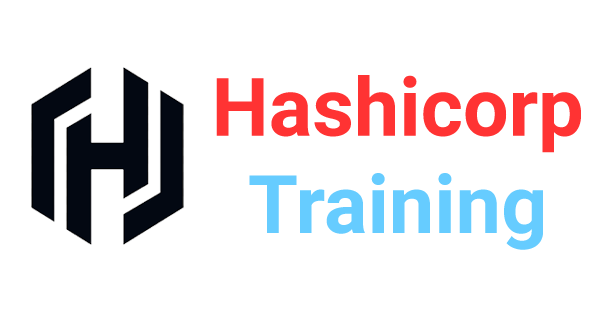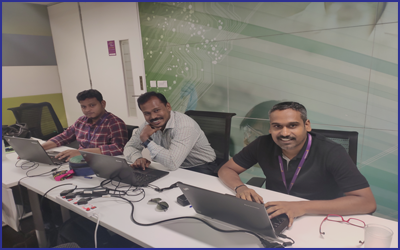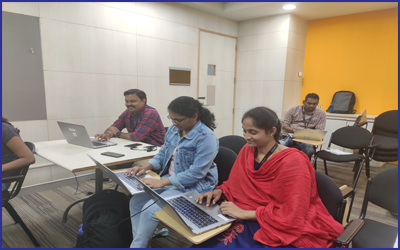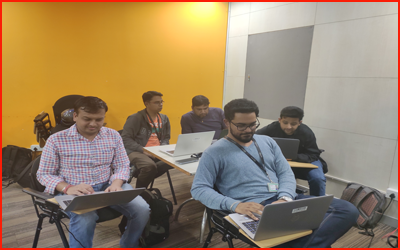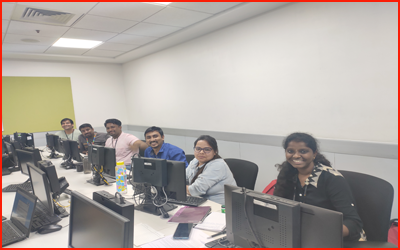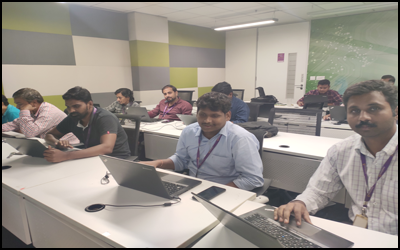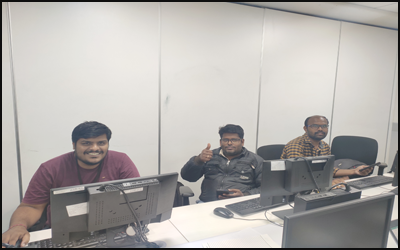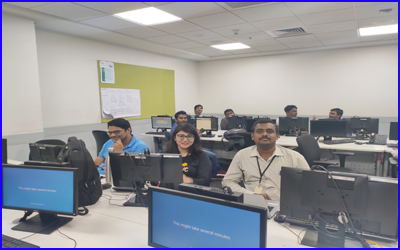8000+
Certified Learners
15+
Years Avg. faculty experience
40+
Happy Clients
4.5/5.0
Average class rating
What is HashiCorp PAM Training Course?
The HashiCorp PAM Training Course is an in-depth educational program designed to provide professionals with the necessary skills and knowledge to implement HashiCorp's security tools—particularly Vault and Boundary—to manage privileged access securely in modern IT environments. As organizations increasingly move toward multi-cloud and hybrid-cloud environments, managing and securing privileged access becomes increasingly complex. HashiCorp's tools offer solutions to manage this complexity with high levels of automation, control, and integration into dynamic environments.
Privileged accounts are one of the largest security risks faced by organizations today. These accounts often provide access to highly sensitive systems, data, and resources, and if compromised, they can lead to catastrophic data breaches, unauthorized access to systems, and compliance violations. The HashiCorp PAM Training Course aims to address these risks by teaching professionals how to leverage HashiCorp Vault (for secrets management) and HashiCorp Boundary (for secure access management) to enforce best practices in securing privileged access.
This course covers the essentials of Privileged Access Management (PAM), including how to implement a Zero Trust security model, how to use Vault for dynamic secrets management, how to utilize Boundary for just-in-time access management, and how to manage credentials and policies to mitigate security risks effectively.
Key Components Covered in the Course:
-
Vault: HashiCorp's open-source tool for secrets management, credential generation, and access control.
-
Boundary: A tool that provides secure access to infrastructure by managing and controlling access to systems and resources through Zero Trust principles.
-
Zero Trust Security: An access control model that requires strict identity verification for every access request, regardless of the network location.
-
Least-Privilege Access: Ensuring that users only have the minimum level of access necessary for their tasks.
Why is the HashiCorp PAM Training Course Important?
1. Securing Privileged Accounts
Privileged accounts, such as system administrators or service accounts, have access to critical systems and sensitive data. Managing these accounts securely is essential to prevent unauthorized access and maintain the confidentiality, integrity, and availability of systems and data. With HashiCorp PAM tools, security administrators can enforce strict access controls that ensure only the right individuals have access to critical infrastructure.
In the era of cloud computing and hybrid infrastructures, where privileged access is spread across different systems, platforms, and providers, manual security controls become inefficient and prone to human error. The PAM Training Course teaches professionals to implement robust access controls through automated workflows and dynamic credential management.
2. Achieving Regulatory Compliance
Many industries, including finance, healthcare, and government, are governed by strict regulatory frameworks such as GDPR, HIPAA, PCI-DSS, and others. One of the key components of these regulations is the need to protect privileged access to critical systems and data.
The course provides learners with the skills to implement audit logs, session recording, and access control policies—essential features for meeting regulatory standards and demonstrating compliance during audits. By adopting these practices, organizations can avoid hefty fines and reputational damage associated with data breaches.
3. Zero Trust and Least-Privilege Access
Zero Trust is a security model that ensures that trust is never assumed for any entity—whether inside or outside the network. Every request for access is thoroughly authenticated and authorized before being granted.
Through this training, participants will learn how to implement Zero Trust principles using HashiCorp's PAM tools, specifically Boundary, to ensure that access is granted only based on the least-privilege principle. This minimizes the risk of unauthorized access by ensuring users only have the necessary permissions to perform their tasks.
4. Operational Efficiency and Automation
One of the biggest challenges in managing privileged access is the manual process of creating, managing, and rotating credentials. Traditional methods are not only time-consuming but also prone to errors.
HashiCorp's tools automate many of these tasks, allowing organizations to reduce credential sprawl and ensure that credentials are always valid when required, but never linger beyond their useful period. The training enables professionals to implement automated credential provisioning, rotation, and revocation, minimizing the risks and administrative overhead associated with manual processes.
Course Features
1. Comprehensive Curriculum
The course curriculum is carefully structured to cover a wide range of topics. From understanding the basics of Privileged Access Management to diving into advanced configuration options for Vault and Boundary, the curriculum is designed to provide comprehensive training for professionals in a variety of roles.
Modules Include:
-
Introduction to PAM: The course starts with an overview of privileged access management and the importance of securing privileged accounts.
-
Vault Fundamentals: This module covers the basics of HashiCorp Vault, focusing on secrets management and dynamic credentialing.
-
Boundary Fundamentals: This module introduces Boundary for managing access to infrastructure and enforcing Zero Trust access control.
-
Advanced Configurations: In these sessions, learners will implement complex configurations for Vault and Boundary, including policies, token management, and integrations with identity providers.
-
Security and Compliance: A key focus of the course is compliance with industry regulations, which requires strong auditing capabilities, session recording, and logging.
2. Hands-on Labs
Participants will get hands-on experience through practical labs that simulate real-world scenarios. In these labs, learners will configure Vault and Boundary, create policies, set up dynamic secrets, implement access policies, and audit access control.
These labs are designed to reinforce theoretical knowledge and give students the confidence to apply what they've learned in a real-world environment.
3. Real-World Use Cases
The training includes case studies and real-life scenarios where participants will tackle challenges such as managing privileged access in multi-cloud environments, handling cross-platform access, and securing hybrid infrastructures. These use cases provide context for the course material and demonstrate the relevance of HashiCorp PAM tools to everyday IT operations.
4. Expert Instructors
HashiCorp's training courses are taught by certified instructors with years of experience in deploying and managing HashiCorp's security tools in various environments. These instructors not only cover theoretical concepts but also provide best practices and troubleshooting tips gathered from real-world deployments.
5. Flexible Delivery Options
The course is available in multiple formats:
-
Instructor-led (virtual and in-person)
-
Self-paced online learning modules
-
Private training sessions for organizations that need tailored content for their specific use cases
This flexibility ensures that the course can be adapted to the learning style and schedule of different individuals and teams.
Training Objectives
The main objectives of the HashiCorp PAM Training Course are to provide participants with the knowledge and skills to:
-
Implement Zero Trust Security Models: Understand how to enforce Zero Trust security using Boundary for secure access management.
-
Leverage Vault for Secrets Management: Use HashiCorp Vault to securely manage secrets and credentials, applying dynamic provisioning and automatic credential rotation.
-
Enforce Least-Privilege Access Policies: Create and implement least-privilege access policies across applications, systems, and infrastructure.
-
Integrate PAM with Existing Systems: Learn how to integrate Vault and Boundary with existing identity providers such as Active Directory and LDAP.
-
Monitor and Audit Access Control: Set up session recording, logging, and auditing in Vault and Boundary to ensure compliance with industry regulations.
-
Scale PAM for Multi-Cloud Environments: Learn how to manage privileged access in multi-cloud and hybrid cloud environments, ensuring consistent security practices across platforms.
Target Audience
This course is tailored for professionals in various roles who are responsible for managing and securing privileged access across an organization's infrastructure. The following roles will benefit from attending the HashiCorp PAM Training Course:
-
Security Administrators: Responsible for implementing security policies, controlling access to sensitive systems, and ensuring compliance.
-
DevOps Engineers: Manage automated workflows, infrastructure deployment, and secure access to cloud resources.
-
IT Operations Managers: Oversee IT systems, ensuring secure access and compliance with organizational policies.
-
Cloud Architects: Design and manage cloud infrastructure, ensuring proper access management across multi-cloud environments.
-
Compliance Officers: Ensure adherence to security regulations and industry standards related to privileged access.
-
Network Engineers and System Administrators: Manage critical systems and ensure privileged access is properly controlled.
Training Methodology
The training methodology is designed to cater to different learning styles and ensure that participants can successfully implement the concepts covered in the course:
-
Instructor-Led Sessions: These are interactive live sessions where participants can ask questions, engage with the instructor, and learn through guided instruction.
-
Self-paced Learning: Participants can access recorded sessions, reading materials, and practice exercises that they can go through at their own pace.
-
Hands-On Labs: Practical labs help learners apply the concepts they've learned in real-world scenarios, ensuring they gain experience with the tools and technologies in use.
-
Interactive Case Studies: Participants will analyze real-world cases and discuss how HashiCorp PAM tools can be applied to solve security challenges.
-
Assessments and Quizzes: To reinforce learning, the course includes regular quizzes and knowledge checks to ensure participants understand the key concepts and can apply them effectively.
Training Materials
Participants in the HashiCorp PAM Training Course will have access to a variety of materials that will support their learning journey:
-
Course Documentation: Comprehensive manuals and guides that provide in-depth information about Vault, Boundary, and PAM best practices.
-
Lab Guides: Step-by-step instructions for performing hands-on exercises and configuring HashiCorp tools.
-
Case Study Examples: Real-world use cases and example configurations to help learners relate the course material to practical applications.
-
Access to Course Recordings: After the course, participants will have access to recordings of the live sessions for review and reference.
-
Sample Configurations: Pre-configured templates and sample policies for Vault and Boundary, helping participants get started quickly.
